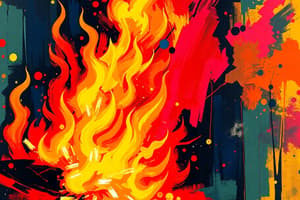Podcast
Questions and Answers
Which scenario exemplifies subrogation in a fire investigation?
Which scenario exemplifies subrogation in a fire investigation?
- A homeowner intentionally sets fire to their property to collect insurance money.
- An insurance company sues a manufacturer of a faulty electrical device believed to have caused a fire. (correct)
- A fire investigator destroys potential evidence to protect a friend from liability.
- An investigator intentionally alters burn patterns at a fire scene to conceal the origin.
In a fire investigation, spoliation refers to what type of action?
In a fire investigation, spoliation refers to what type of action?
- The act of providing false testimony under oath to mislead investigators.
- The intentional or negligent destruction or alteration of evidence. (correct)
- The legal process of substituting one creditor for another to recover losses.
- The process of determining the financial motives behind arson.
If a fire investigator suspects arson, which potential criminal charges might be relevant?
If a fire investigator suspects arson, which potential criminal charges might be relevant?
- Arson, insurance fraud, and murder. (correct)
- Trespassing, vandalism, and disorderly conduct.
- Libel, slander, and invasion of privacy.
- Embezzlement, forgery, and identity theft.
What is the primary implication of 'human involvement' in the context of most fire incidents?
What is the primary implication of 'human involvement' in the context of most fire incidents?
Which scenario would NOT be considered an example of spoliation?
Which scenario would NOT be considered an example of spoliation?
Flashcards
Subrogation
Subrogation
The legal act of substituting one creditor for another. Often seen when an insurance company seeks compensation for a fire caused by a defective product or negligent servicing.
Spoliation
Spoliation
Intentional destruction or negligent alteration of evidence, which can have legal consequences in fire investigations.
Motives for Arson
Motives for Arson
In fire investigations, these can be broad covering financial gain, revenge, or other underlying reasons for setting a fire.
Criminal Charges Related to Fires
Criminal Charges Related to Fires
Signup and view all the flashcards
Study Notes
- Most fires involve human activity in some capacity.
- Motives behind intentionally set fires can vary widely, spanning financial gain and acts of revenge.
- Arson, insurance fraud, and murder are potential criminal charges related to fires.
- Subrogation is substituting one creditor for another, such as an insurance company pursuing a case against a party whose defective product or service caused a fire.
- Spoliation is intentionally destroying or carelessly altering evidence.
Studying That Suits You
Use AI to generate personalized quizzes and flashcards to suit your learning preferences.





